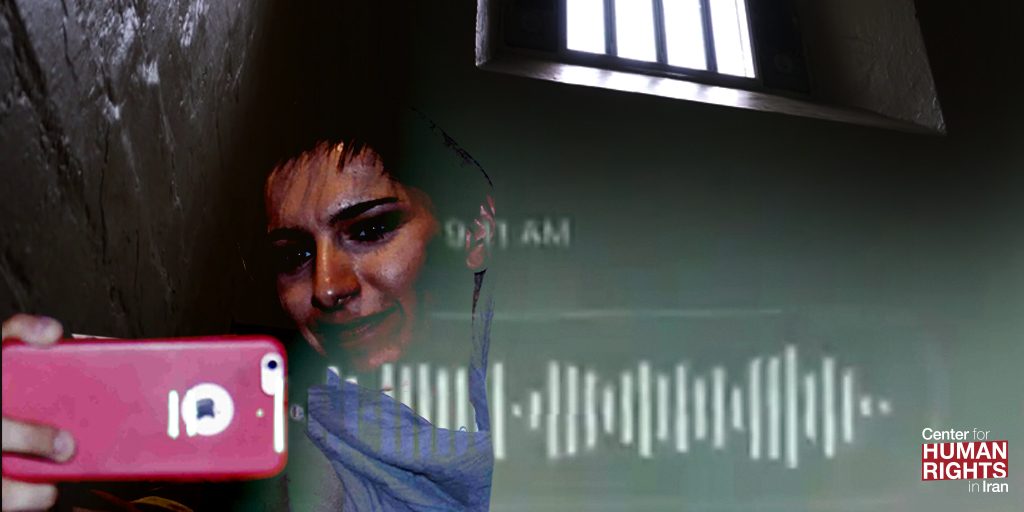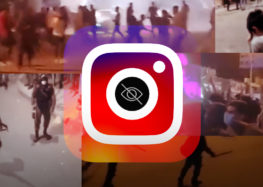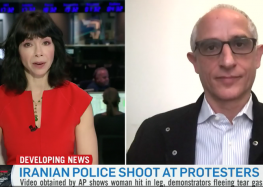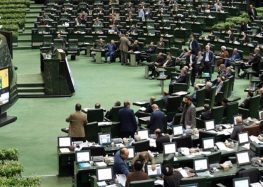Iranian Authorities Force Detained Photographer to Threaten Activist With Eerie Voice Message

Nooshin Jafari Detained and Used as Bait to Gain Control Over Anti-Government Twitter Account
A tearful audio message containing the voice of Nooshin Jafari, a photographer held under close supervision in an undisclosed section of Tehran’s Evin Prison, has raised alarms over her safety amid fears that she was forced to send the message under extreme duress.
“Shiva Jan, I’m under a lot of pressure here. Please give me the password and email address for [the “Yare Dabestani” account] on Twitter,” said Jafari in the Instagram direct message sent on August 21, 2019, to former political prisoner and human rights activist Shiva Nazarahari.
“They will put your family under pressure if you don’t give it,” added Jafari. “Please help to save me as soon as possible. They are blaming poor me for everything.”
Individuals detained in Iran for politically motivated reasons can be denied phone access with anyone including their lawyers or family members for various periods ranging from weeks to months.
Upon being detained, they are also forced to hand over their phones and social media account passwords to agents who use the devices to spy on the detainee’s communications as well as gain access to contact lists.
The detainees are denied access to personal phones or digital devices while they are in detention. Those who do gain access to smuggled phones take extreme measures to hide the devices to avoid being punished.
These reasons explain why Nazarahari was not only shaken by the message but also certain that Jafari did not send it on her own accord.
“The first message was online for about 10 minutes and then they sent another message asking why I hadn’t responded,” Nazarahari, who is based in Europe, told the Center for Human Rights in Iran (CHRI). “When I went to reply, the original message had been deleted.”
“In a couple of words, it was shocking and crushing,” she added. “Since then, I feel my life has been divided into the time before and after this message. It has changed everything.”
The message was sent from the private Instagram account of Jafari, which she had used to post pictures of her life for her family and friends prior to being arrested on August 4.
The sender deleted the message soon after it was sent, but Nazarahari—who is familiar with the methods Iranian authorities use to pressure detainees from her own experiences of being a political prisoner in Iran—had already posted a recording of it on her Twitter account.
At a press conference on August 26, Judiciary Spokesman Gholam-Hossein Esmaili refused to directly answer a question about the message.
“We believe it is a positive aspect of our prison system that inmates can contact their families and associates,” Esmaili said. “Regardless of whether this audio file belongs to the suspect or not… anyone can make false claims.”
“But the claim about being under pressure is not correct,” he added. “Our investigations in detention are surely carried out within laws and regulations.”
The UN has documented numerous cases in which detainees arrested for political reasons in Iran have been denied due process including access to a lawyer of their choice and a fair trial as well as been subjected to extreme and inhumane interrogation methods including psychological and physical torture.
Jafari was denied phone contact with anyone until August 19, “16 days” after she was detained, according to a report published in the state-funded Islamic Republic News Agency (IRNA).
Jafari has also been denied a lawyer of her choice.
“Nooshin Jafari’s lawyer Amir Reisian told IRNA that he went to the security court on August 18 to declare his legal representation of her to the case investigator,” tweeted film director Reza Dormishian. “But he was not allowed to do so because they said this is a security case.”
Since late 2017, detainees held on national security-related charges—including journalists, activists, and defense lawyers—have been told to choose their counsel from a list approved by Iran’s chief justice.
This violation of international standards of due process has been condemned by lawyers and rights groups based inside and outside the country.
Why Was Jafari Arrested and Forced to Send the Message?
Nazarahari said she has known Jafari “for a very long time” but had lost touch with her in recent years after Jafari became a photographer for film and theater productions.
Nazarahari spent several years in Tehran’s Evin Prison in the early 2000s for engaging in peaceful activism.
“I clearly understand what Nooshin is going through,” she told CHRI. “There’s so much pressure on her and so little information allowed to reach the prison that it can completely mess up her mind.”
Iranian authorities have not announced any charges against Jafari, whose detention shocked her family and friends.
“Nooshin Jafari has been arrested for baseless reasons and keeping quiet will not be to her benefit,” said theater director Mohammad Yaghoubi on Instagram on August 9.
Anonymous Persian language Twitter accounts that operate as echo chambers for hardline politicians and policies in Iran speculated that Jafari’s latest arrest was due to her alleged cooperation with human rights investigators and alleged ties to a so-called “counter-revolutionary” account on Twitter.
These anonymous accounts, referred to as “arzeshi” in Persian—meaning someone who advocates Islamic Republic state policies and values—work to rally public opinion against citizens who’ve been detained under politically motivated charges, spread rumors about their alleged crimes, and create an atmosphere of fear for others.
Specifically, the arzeshi accused Jafari of operating the Yare Dabestani Twitter account, which she referred to in the now-deleted voice message that was sent to Nazarahari.
To date, Iranian officials have not mentioned any evidence that would suggest either woman had control over the account.
After the message containing Jafari’s voice was sent to Nazarahari, some speculated on social media that Jafari was arrested to be used as bait in the government’s desperate attempt to gain control over the Yare Dabestani account.
Online content—especially content that is critical of the Iranian government or its policies—is severely censored by the Iranian government.
CHRI has documented numerous instances wherein Iranian agents have forcibly gained control over citizens’ private social media accounts to censor content and spy on follower lists.
Nazarahari ultimately replied to Jafari’s voice message well aware that agents would be listening on the other end.
“Nooshin Jan, I’m very sorry to be hearing your voice after a couple of years under these circumstances,” she said in an audio reply that she also posted on her Twitter account. “I became aware of this offensive [Yare Dabestani] account after your arrest.”
“They [security agents] know that this account has nothing to do with us,” she added. “My activities have always been open and transparent and the Intelligence Ministry has a record of my activities following numerous arrests.”
She continued: “We have always respected the people’s sacred beliefs and this kind of offensive language [posted on the Yare Dabestani account] has never been part of our vocabulary. I’m sorry that I’m unable to help and I hope this misunderstanding is cleared up and you’re freed as soon as possible.”
Read this article in Persian.






